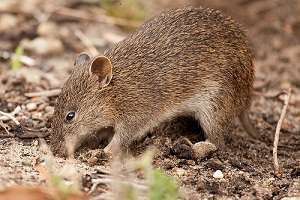Review highlights ecosystem's lack of immunity

A review which found dwindling numbers of small foraging mammals in Australian bush who could have a hand in ecosystem decline has raised more questions than answers for the researchers involved.
Murdoch University Associate Professor Trish Fleming and UWA expert Dr Leonie Valentine, released a paper in Mammal Review, which found digging mammals – such as bilbies, bandicoots, potoroos, echidnas and woylies – have a substantial effect in terms of turning over organic matter into the soil.
By turning over the soil these mammals, known as biotic engineers, increase the nutrient viability which provides increased nutrients to plants allowing them to grow more vibrantly and have much more vigour, meaning they will be more resistant to pathogens.
A/Prof Fleming says many of these animals are looking for fungi and its fruiting body, which is underground.
"They are mechanically moving soil which is causing the nutrients or the litter to become trapped, therefore increasing nutrient turnover," she says.
"It is kind of like a little cycle.
"When you lose that increase in nutrients you lose the animals, the microorganisms, the fungi which would use those nutrients to grow and then you would end up with fewer animals digging the soil so it becomes like a spiral."
A/Prof Fleming says they can also help spread tree seeds such as the sandalwood, increasing the genetic quality of species.
She says some of these biotic engineers can turn over vast amounts of soil; a woylie will create between 20 and 100 excavations each night and a southern brown bandicoot, which create little pits as they dig looking for food, 3.9 tonnes a year.
"Those little pits increases water infiltration which decreases water runoff," she says.
"It also means water gets down to the roots."
While the review has shown there may be a link between the decline of foraging animals and the ecosystem, A/Prof Fleming says it has left them with serious questions that are not easily answered.
"Our argument is we are in a situation where we have ecosystems that are not showing great resistance," she says.
"We have got declines in tree species, and declines across very large landscape levels in plant health. "The question we are asking is has the loss of a key ecosystem process contributed to that decline?"
She says there is no answer to that question, but researchers are examining whether restoring some of those processes by putting animals back into the system may be one possible solution.
Provided by Science Network WA




















